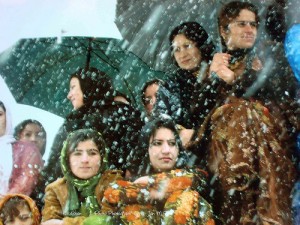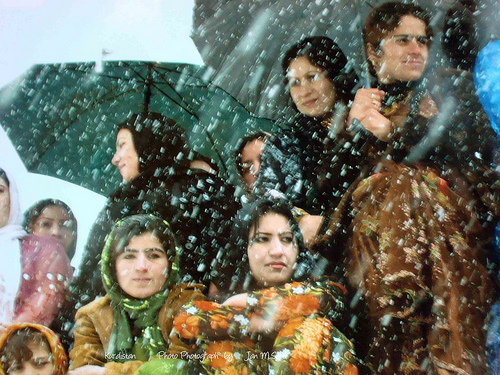by Carly West
What does the world look like in 2601?
For the Kurds, it looks divided and disenfranchised, as this minority ethnic group of approximately 18 million people, struggles to protect its civil rights.

For the Kurds, whose historical calendar equates the year 1 to 612 B.C. (to mark the foundation of their ancestral empire), 2061 is right now– yet another year of resistance against threatening governments throughout the Middle East.
For over two thousand years, the Kurds, a distinctive people of Indo-European origin, have inhabited the mountainous regions from Iran to Turkey. And yet, Kurdistan has never been successful in securing a national status.1
The history of Kurdistan as a geographic entity is quite complex. Various independent Kurdish kingdoms and largely autonomous principalities have reigned over this region, but never have united in a formal state. Instead, this disjointed population has strived to protect its rights and sovereignty, despite the continual presence of foreign occupiers throughout the centuries. Confronted with the choice of being annexed by Persia or accepting an alliance with the Ottoman Empire, Kurdistan joined the Ottomans in 1514, subsequently enjoying three centuries of peace and relative independence. However, with the rise of Western notions of nationalism, Kurds realized their own right to self-determination. The 19th century was marked by uprisings and war for the independence of Kurdistan, which were harshly quelled by the Ottomans. 1
After WWI and the weakening of the Ottoman Empire, the Kurds saw an opportunity to stand their ground. A group of Kurds formed a delegation at the Conference of Versailles to present their claim for a Kurdish nation. This action finally prompted the international community to consider the Kurdish appeal for independence. In the International Treaty of Sèvres between the Allies and the Ottoman Empire, it was recommended that the Kurds be able to “establish a Government within those frontiers” of Iraqi territory. However, this was agreement went unheeded. 2
Kurdistan found itself deprived of its cultural identity and divided between four states: Turkey, Iran, Iraq and Syria. The quest for self-governance continues in each of these states, but to varying degrees of success. Kurds continue to be victims of oppression and persecution, finding transient security only when foreign actors are looking for an ally in the region. As the West has gotten increasingly entrenched in the Middle East and dependent on the oil-rich territories, policy regarding the plight of the Kurds is notably shaped by a Western realpolitik agenda.
In 1925, the British appealed to the League of Nations to annex the Kurdish region into Iraq, where it had a mandate for 25 years, in order to secure and exploit the rich oil reserves. The British promised the Kurds that the new Iraqi government under their control would recognize the right of the Kurds within Iraq, and look to establish a source of governmental autonomy within those frontiers. Such promises were kept neither by the British nor the subsequent Iraqi regime that took over in 1932. 3
In 1946, the Soviets decided to support the establishment of a Kurdish republic in Iran, who was occupied with Allied forces at the time. This collapsed in 1946 when the Soviets withdrew, after a year at the end of the war, blatantly demonstrating the strategic motives. The Iranian central government destroyed the Kurdish republic and executed the leaders. In the 1980s, during the Iran-Iraq War, the Kurds of north Iraq rose up against Hussein’s regime with the support of Iran; soon after, however, Iran and Iraq made a deal, and the Kurds were, once again, persecuted. 4
During the 1950’s and 60’s Iraq waged massive campaigns to persecute and expel the Kurds. The United States actually supported the oppressive Iraqi regime to gain leverage against Iran, which was viewed as the more significant threat. In fact, the U.S. government tacitly supported Iraq’s attack on Iran in 1980. 4 It was therefore not in Washington’s immediate strategic interest to notice the atrocities committed against the Kurds. Iraq also tested their first chemical weapons, cyanide and mustard gas, on Kurdish civilians.2 In March 1988, the Iraqi regime launched poison gas attack against the Kurdish town of Halabja. At least five thousand civilians, mostly women and children, were killed. There was public outcry, but attention to the Kurds soon faded away. 5
Though the United States was a passive bystander in the wake of the attacks, the Bush administration recalled Saddam’s brutality against the Kurds and usage of chemical weapons (which the U.S. had essentially funded), as grounds for invading Iraq in 2003. 6 This demonstrates the irony of American humanitarianism and the tragic reality of realpolitik: we will do nothing in the face of atrocity, only to exploit it later to justify our independent interests.
It is blatant that gross injustices have been inflicted upon this people. They have been pawns of regional and global politics and stripped of their autonomy. That said, the Kurds’ vision for themselves remains fragmented. Most Kurds do indeed demand safety from persecution, a degree of self-governance, and the right to preserve their cultural identity. In Turkey, for example, Turkey’s Kurdish Worker’s Party (PKK) is a militant group that has used public assassinations and bombings to fight for an independent Kurdistan.7 However, not all Kurds are roused by the vision of a fully independent nation, and prefer local autonomy. Antagonisms between competing factions of Kurds, often deliberately aggravated by outside intervention, have also been a major obstacle in the Kurds’ struggle for freedom.5
Though the Kurds have certainly had enough of false promises from the West, there are real policy steps we can take to break the cycle. Above all, we must make our government make humanity a priority. The realpolitik approach to Middle Eastern affairs seems critical; however, this calculating approach has generated the deep animosity towards the West that get us further entrenched in the region. At Brown, we benefit everyday from our diverse community, and value the openness and tolerance of our society. Now is the time, in 2601, to protect these fundamental human rights for all people, no matter who you are or where you’re from.
Bibliography
3 “A Nation Without A State: The Kurdish Question”.
Https://Www.Mtholyoke.Edu/~Jlshupe/Pol116.Html
2 “How the Kurds Were Denied a State” Revolutionary Worker Online, January 25, 2004,
http://www.revcom.us/a/1226/kurdssidebar.htm (Cited from Larry Everst’s Oil, Power & Empire: Iraq and the U.S. Global Agenda Chapter 2: “The British Creation Of Iraq”)
7 Bruno, Greg. “Inside the Kurdistan Workers Party (PKK)” Council on Foreign
Relations. October 19, 2007 http://www.cfr.org/turkey/inside-kurdistan-workers-party-pkk/p14576#p1
Callimanopulos, Dominique. “Kurdish Repression in Turkey”. February 9, 2010.
Cultural Survival, Inc. http://www.culturalsurvival.org/publications/cultural-survival-quarterly/turkey/kurdish-repression-turkey
6 Gaspar, Phil “The Betrayal of the Kurds” Internationalist Socialist Review, April
2003.http://www.thirdworldtraveler.com/Global_Secrets_Lies/Betrayal_Kurds.html
5 Hiltermann, Joost R. “Halabja : America didn’t seem to mind poison gas” January 17,
2003 New York Times. http://www.nytimes.com/2003/01/17/opinion/17iht-edjoost_ed3_.html
1 Nezan, Kendal. “A Brief Survey Of The History Of The Kurds” Http://Www.Institutkurde.Org/En/Institute/Who_Are_The_Kurds.Php
4 Smith, Benjamin. “Land and Rebellion: Kurdish Separatism in Comparative
Perspective”.http://government.arts.cornell.edu/assets/psac/sp09/Smith_Kurdish_Separatism_Feb09_PSAC.pdf
*It’s impossible to condense the history of the Kurds into such a space, so there are inevitably huge lapses in time and important instances in Kurdish history I neglected. If you are interested in more detailed accounts of their culture and history, here are some websites in addition to my sources:
http://www.krg.org/a/d.aspx?l=12&s=03010600&r=143&a=18686&s=010000
